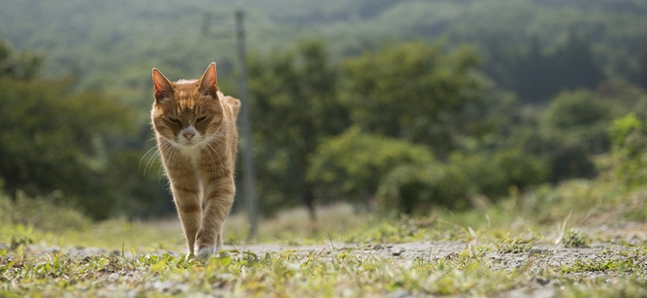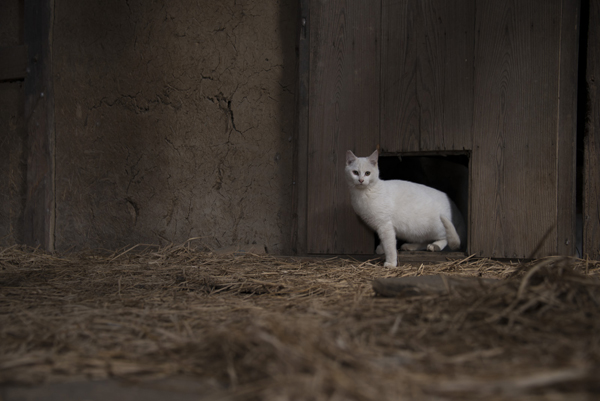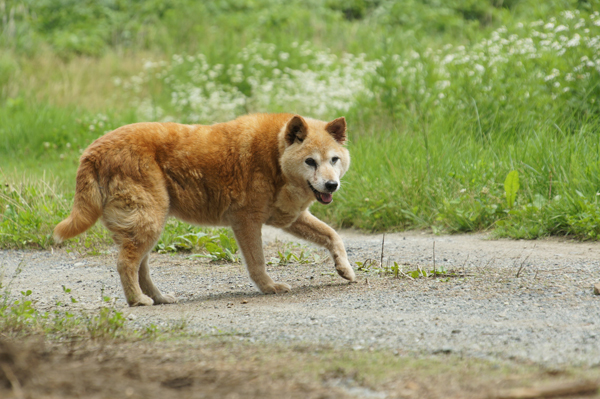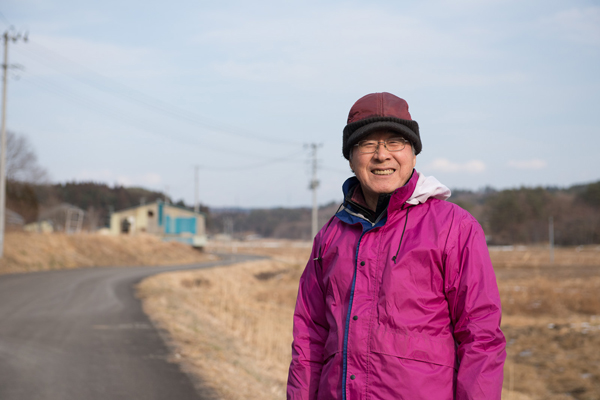The battle for life
Volunteers in Fukushima continue the desperate struggle to save abandoned pets

Posted: Mon Mar 10 2014
Blessed with lush hills and plains, Iitate in Fukushima Prefecture used to be known as a prosperous farming region. After the March 2011 disaster at the Fukushima Dai-ichi nuclear power plant, this area, located 30-50 kilometres from the power station, was designated a Deliberate Evacuation Area due to severe radioactive contamination that exceeded 20 millisieverts per year. The more than 6,000 residents of Iitate remain displaced even today. As pets are not allowed in the temporary housing units in which most evacuees live, residents had to leave their dogs and cats behind, only occasionally returning to their former homes to take care of their animal companions. It takes anywhere from 40 minutes to an hour to travel from the temporary housing areas, which number 10 in total, to the village itself. The mainly elderly evacuees have lived in this limbo for three years now, and very few families are able to make the trip to the village on a daily basis.
Every day, Teruo Hibi, 70, travels 65km from the city of Koriyama to take care of the pets left behind in Iitate. He’s been doing it for almost 400 days now – a dramatic turnaround from the quiet life of retirement this outdoorsman and amateur mountaineer had imagined. His life changed in February 2012, almost a year since the Great East Japan Earthquake. Living in Kobe at the time, Hibi had just started using Twitter, through which he noticed the plight of the Iitate pets. He was shocked to hear of such misery only now, a year after the disaster, and quickly started researching the issue online.
In order to see the situation with his own eyes, Hibi travelled to the affected areas in April of that same year, volunteering at an animal shelter, and from May, started visiting the village twice a month, for two days at a time by train and rental car. Sharing maps and information with fellow volunteers he had met online, Hibi patrolled 50-60 houses every day between 5am and 9pm, feeding the stranded animals. Returning to his hotel at night, he collapsed into bed before heading out again next morning. Often unable to control his emotions on the way home to Kobe, he sometimes burst into tears on the Shinkansen. Feeling that visiting twice a month wasn’t enough, Hibi decided to move to Fukushima in July. After finding a suitable place in Koriyama, he moved in the following month, and has been doing his feeding rounds practically every day since September 2012.
 Dogs roam the mountainous village of Iitate
Dogs roam the mountainous village of Iitate
 Cats were left behind as well
Cats were left behind as well
The reasons for his decision can be traced back to the destructive Kobe earthquake of 1995. When the quake hit, Hibi, who has lived most of his life in Kobe, was the director of a hospital in one of the worst affected areas and came face-to-face with the victims. Temporary housing and other support mechanisms were far worse at the time than after the 2011 quake. It was not only the quality of the housing units that was lacking; the system of choosing residents by lottery broke down communities, divided residents and resulted in several lonely deaths. Hibi’s hospital also worked to get so-called earthquake-related deaths recognised, which later led to the awarding of damages to the victims. His wife Yuko, a practising nurse, had travelled to the disaster areas in Miyagi Prefecture the day after 3.11 to provide medical assistance. Their experiences in Kobe convinced the Hibis of the importance of continued support for the disaster victims in Tohoku, so the decision to move to Fukushima was not a difficult one.
Compiled in cooperation with other volunteers and with information gathered on the ground, the constantly changing list of 210 households in Iitate includes 198 dogs and 314 cats. The amount of cats has remained impossible to determine with any certainty, but the volunteers estimate that there are at least two times more cats than dogs. The pets' lives have been completely disrupted – there’s nobody to take them out for a walk or to provide them with daily meals. Hibi works as hard as possible to keep them alive.
 Many of the kittens born after the disaster are unaccustomed to humans
Many of the kittens born after the disaster are unaccustomed to humans
He realised the precarious state of the domestic cats in the village after observing one of them tending to its young. Even if the cat brought its offspring inside the house, there was obviously nobody there to feed it. Leaving a sufficient supply of food is also not without its problems – the volunteers have to get permission from every homeowner, and improvise in order to keep the food hidden away from crows and other wild animals. Giving an approaching cat warm, nutritious food right there on the spot is the best course of action. The villagers and volunteers have differing opinions on whether the reproduction of the pets should be controlled, but the feeding activities continue regardless of that debate. Although changing circumstances sometimes upset his plans, Hibi tries to visit every house in the village at least every three days. The weakest of the weak, including recently born kittens and their mothers, as well as elderly dogs, require constant care.
 Chibi, the elderly dog
Chibi, the elderly dog
One day in September 2012, in a hard-to-reach house deep in the mountains, Hibi first encountered a dog so ragged that he thought it had already died. He came to spend 10 unforgettable months with this Chibi, 18 years old, who had been completely abandoned by its owner. The dog was too weak to eat much, but Hibi kept finding ways to sneak nutritious feed into its mouth, helped it move around, and always took half an hour out of his busy schedule to stay by its side. Light finally returned to Chibi’s eyes, and its fur also regained its gloss. However, next summer, old age began to take its toll again, and Hibi thrice found the dog collapsed in high grass. Chibi also had an accident and became even weaker, and finally died in July 2013 with its owner and Hibi by its side. From then on, he began to work harder to involve the pets’ owners: he felt it important to help deal with the feelings of guilt some of these people had about having had to leave their pets behind.
Hibi argues that his volunteering is most of all about supporting people. This also becomes evident when reading his blog, which he updates every day after returning from the village. His entries reveal how hard he tries to reduce the indebtedness, loneliness and suffering that many of the pet owners feel after having been forced to part with their companions so suddenly. His blog functions not only as a source of information about conditions in the village, but is also a great help for himself when planning the feeding route for the following days. Last month, after his 70th birthday, Hibi began taking one day off every four days. Despite all the pressure, he has decided not to attempt the impossible and only keep working to the best of his ability.
The continued work of Hibi and his fellow volunteers has made it possible for some pets to return to their evacuee families or to be adopted by others. ‘Mimamoritai’, the local neighbourhood watch organisation, has come to see their activities more positively, and new volunteers continue to pour in from all over the country. Hibi keeps hoping for more support, but would also like his work to become unnecessary as soon as possible. He stresses that to bring back what they have lost little by little, the residents have to stand up for themselves and demand improvements in their living environment. What he fears most of all is that some of the abandoned houses will begin to be torn down, as this would result in pets being driven out into the wild, left without shelter from neither the elements nor predators.
 Teruo Hibi doing the rounds in Iitate
Teruo Hibi doing the rounds in Iitate
All around the village, giant black lumps of contaminated soil are being dug up to be relocated, and there are plans to build incinerators in order to dispose of the radioactive waste from surrounding areas. There is no end in sight for such post-disaster struggles, and the invisible threat of radiation continues to engulf the village. The villagers cannot do anything to realise their dream of going back to their homes. Constantly reminded of lives being left behind, and venturing into even the most contaminated areas without hesitation, Hibi still stays motivated: ‘Our generation was the one responsible for building the “nuclear society”, so most of all I feel sorry. I want to make sure that there’s a conclusion to this story, be it five or 10 years down the road. Because of that, I will keep working with the disaster victims, hopefully for at least seven more years’.
Six years from now, the Olympics will put Tokyo at the centre of global attention. Will warnings about countless lives continuing to be trampled into the ground be heard? Despite the fact that another huge earthquake and tsunami is not out of the question, the government continues to push for power plant restarts and the export of nuclear technology. It has been three years since the tragic accident, and only 250 kilometres from the capital, in a snowy village, lives continue to be recorded, saved, and lost.
Teruo Hibi's blog (in Japanese) ameblo.jp/t-hibidas/
Fukunekoya animal shelter fukunekoya.com/
Tags:
Tweets
- About Us |
- Work for Time Out |
- Send us info |
- Advertising |
- Mobile edition |
- Terms & Conditions |
- Privacy policy |
- Contact Us
Copyright © 2014 Time Out Tokyo















Add your comment